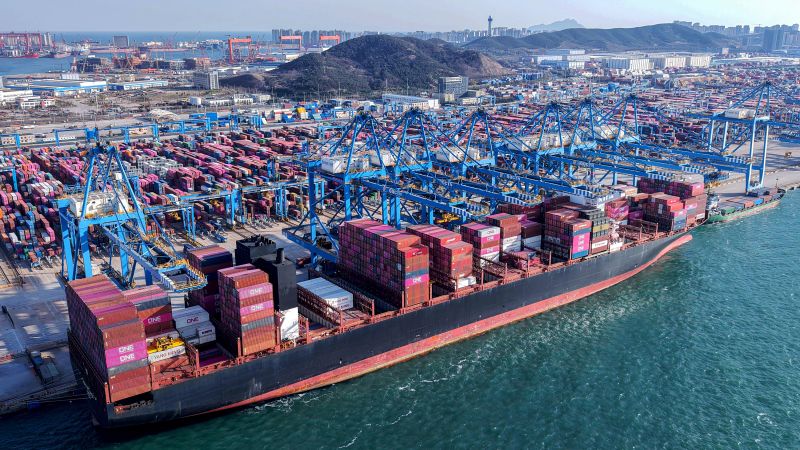
Dow set to tumble 1,500 points after China retaliates against Trump’s tariffs
CNN
US stocks were set to plunge Friday after China retaliated against the United States for President Donald Trump’s tariffs.
US stocks were set to plunge Friday after China retaliated against the United States for President Donald Trump’s tariffs. Dow futures fell 1,500 points, or 3.7%. The broader S&P 500 was set to open 3.7% lower, on pace to enter correction territory — a decline of 10% from a recent peak. The tech-heavy Nasdaq Composite, already in correction, was on pace to start the day 4% lower and is flirting with bear-market territory — a decline of 20% from its peak. Investors had been fearful that a dramatic escalation of the trade war could plunge the US and global economies into a recession. JPMorgan analysts said Thursday that America’s economy and the broader world economy both had a 60% chance of sinking into a recession this year. The analysts also said odds of a recession would rise if countries began to retaliate against the United States — and China did so Friday. Retaliation raises the risk of further escalation and could diminish hopes for negotiation. “Markets may actually be underreacting, especially if these rates turn out to be final, given the potential knock-on effects to global consumption and trade,” said Matt Burdett, head of equities at Thornburg Investment Management. “The tariffs have injected a level of uncertainty and volatility we haven’t seen since the early days of the pandemic.” Traders ditched risky stocks, especially tech companies whose products are manufactured overseas and could soon be subject to enormous tariffs. Apple (AAPL), which tumbled more than 9% Thursday, was down another 5% Friday in premarket trading. Amazon (AMZN) was 7% lower. Instead, they poured money into traditional safe havens, including government bonds and gold.

President Donald Trump and his advisers said this was the plan all along: Scare the bejesus out of the world by announcing astronomically high tariffs, get countries to come to the negotiating table, and — with the exception of China — back away from the most punishing trade barriers as America works out new trade agreements around the globe.

If paying $1,000 for a new iPhone already sounded expensive, consumers should brace for even greater sticker shock later this year. President Donald Trump’s tariffs on foreign goods – specifically those sourced from China – are expected to heighten the prices of everyday tech products, from iPhones to laptops, cars and even smaller gadgets like headphones and computer mice.

The US stock market, fresh off its third-best day in modern history, is sinking back into reality: Although President Donald Trump paused most of his “reciprocal” tariffs, his other massive import taxes have already inflicted significant damage, and the economy won’t easily recover from the fallout.





















 Run 3 Space | Play Space Running Game
Run 3 Space | Play Space Running Game Traffic Jam 3D | Online Racing Game
Traffic Jam 3D | Online Racing Game Duck Hunt | Play Old Classic Game
Duck Hunt | Play Old Classic Game








